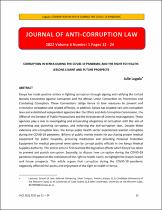| dc.contributor.author | Lugulu, Julie | |
| dc.date.accessioned | 2022-10-25T10:06:26Z | |
| dc.date.available | 2022-10-25T10:06:26Z | |
| dc.date.issued | 2022 | |
| dc.identifier.citation | Lugulu, J. (2022). Corruption in Kenya during the Covid-19 pandemic and the right to health: Lessons learnt and future prospects. Journal of Anti-Corruption Law, 6(1), 12 – 24. | en_US |
| dc.identifier.issn | 2521-5345 | |
| dc.identifier.uri | http://hdl.handle.net/10566/8076 | |
| dc.description.abstract | Kenya has made positive strides in fighting corruption through signing and ratifying the United Nations Convention Against Corruption and the African Union Convention on Prevention and Combating Corruption. These Conventions oblige Kenya to take measures to prevent and criminalise corruption and related offences. In addition, Kenya has enacted vast anti-corruption laws and established independent agencies like: the Ethics and Anti-Corruption Commission, the Office of the Director of Public Prosecutions and the Directorate of Criminal Investigations. These agencies play a role in investigating and prosecuting allegations of corruption with the aim of preventing and punishing corruption, and enforcing the anti-corruption laws. Despite these extensive anti-corruption laws, the Kenya public health sector experienced wanton corruption during the COVID-19 pandemic. | en_US |
| dc.language.iso | en | en_US |
| dc.publisher | University of the Western Cape | en_US |
| dc.subject | Covid-19 | en_US |
| dc.subject | Corruption | en_US |
| dc.subject | Public health | en_US |
| dc.subject | Kenya | en_US |
| dc.subject | African Union Convention | en_US |
| dc.title | Corruption in Kenya during the Covid-19 pandemic and the right to health: Lessons learnt and future prospects | en_US |
| dc.type | Article | en_US |

